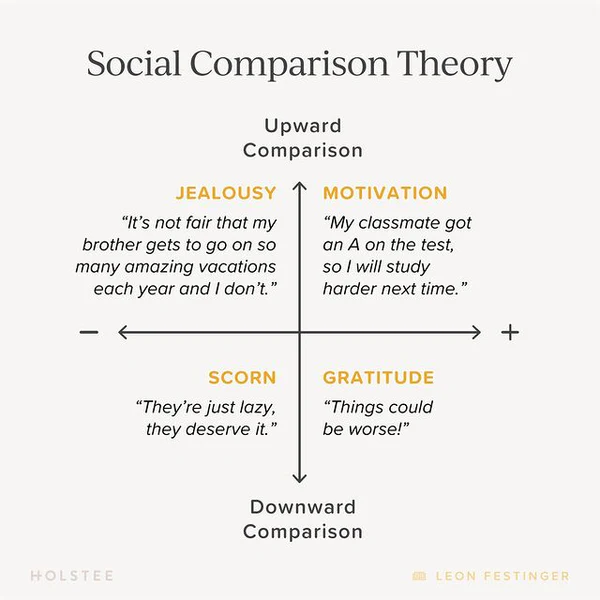
Menu

Navigating the choppy waters of dealing with jealous and competitive friends is a topic many of us encounter but often struggle to address effectively. Whether it’s the subtle undercutting of your achievements or the overt competition, recognizing and managing these dynamics can significantly impact your personal growth and happiness.
In this post, I’m not just going to help you spot the signs of jealousy and competition among friends; we’re going to explore strategies to handle these situations with grace, empathy, and assertiveness.
The goal is to foster healthier, more supportive friendships that uplift rather than undermine. So, if you’ve ever found yourself puzzled by a friend’s behavior or felt the sting of their competitive spirit, you’re in the right place.
If you’re dealing with a jealous and competitive friend or family member, keep reading!
If you’re like me, you have probably wondered what makes a friend jealous or see you as competition. As someone who has dealt with people like this, I’ve performed extensive research and reflection to find the answer.
At its core, jealousy and competition among friends stem from a complex mix of psychological, social, and possibly evolutionary factors. It’s a multifaceted emotion that can sneak into friendships, often wearing the disguise of motivation or even admiration. But why does this happen? Let’s unpack the layers.
One of the primary drivers behind jealousy and competition is insecurity. According to one study, individuals who are insecure about their status, abilities, or relationships are more likely to experience feelings of jealousy. This insecurity can be a silent whisper in one’s ear, saying they’re not good enough unless they’re better than someone else, even if that someone else is a friend.
Social comparison theory, introduced by psychologist Leon Festinger in the 1950s, suggests that people have an innate drive to evaluate themselves, often in comparison to others. This can be particularly pronounced in the age of social media, where everyone’s achievements are on display, sometimes leading to a competitive environment among friends. Mix in elements like social media, and this is only amplified.

From an evolutionary standpoint, jealousy and competition have roots in survival and reproductive strategies. Competing for resources, whether they be food, shelter, or mates, has been a part of human history. While modern society has evolved beyond these primal needs, the underlying emotional mechanisms remain, manifesting in our personal and professional relationships.
Heck, some competition in a friendship isn’t bad. For example, in the masterminds I have with my friends, we hold each other accountable to our goals and push each other to grow. There’s a healthy degree of competition between us to become better.
FOMO, a term popularized in the digital age, also plays a role in fostering jealousy and competition among friends. FOMO could lead to negative feelings when comparing oneself to others, especially when those comparisons highlight a perceived deficit in one’s own life or achievements.
Understanding these underlying reasons can be the first step in addressing and mitigating feelings of jealousy and competition in friendships. Recognizing that these feelings are often more about us than about our friends can help us approach these emotions with empathy and understanding, both for ourselves and for others.
Next, let’s talk about the signs that someone is envious, jealous, or competitive. You might have already seen these traits in people, but, if not, you will now be able to observe them.
Competitive friends often engage in the comparison game, but it’s not the fun kind. They’re constantly measuring their life against yours, from career achievements to personal milestones. It’s as if every aspect of life is a competition, and they’re keeping score.
This behavior can stem from their insecurities or a deep-seated need to prove themselves. I had a friend who would constantly try to compare themselves to me and copy what I did. As they say, imitation is the sincerest form of flattery, so don’t take it personally. Or, if anything, see it as a compliment.
Ever received a compliment from a friend that felt… off? Competitive friends often master the art of the backhanded compliment. It’s a blend of praise and criticism, designed to make you question your achievements. “Wow, I’m surprised you got that job; you’re so lucky!” is a classic example. It sounds like a compliment but carries an underlying message that perhaps you didn’t fully deserve your success.
Conversations with a competitive friend can feel like a never-ending game of one-upmanship. Share a story about a recent weekend getaway, and they’ll recount their month-long trek through the Amazon. It’s exhausting because it shifts the focus from sharing experiences to competing over who has the more impressive story.
A competitive friend might struggle to show genuine happiness for your successes. If you sense a lack of enthusiasm—or worse, a dismissive attitude—when you share good news, it could be a red flag. True friends celebrate each other’s victories without reservation.
Competitive friends often want to keep you in their orbit but at a distance that prevents you from surpassing them in any way. They’re happy to be your friend as long as they feel one step ahead. This dynamic can be subtle, manifesting in how they share opportunities or information with you.
Recognizing these signs can be a revelation, shedding light on why certain friendships feel more draining than uplifting. It’s important to approach this realization with a blend of self-reflection and compassion, both for yourself and your friend.
Now, let’s get practical. Dealing with jealous and competitive friends is akin to navigating a delicate dance. It requires a blend of tact, understanding, and, most importantly, boundaries. If you’ve recognized the signs of jealousy or competitiveness in a friend, you’re already on the path to addressing it.
But what comes next? How do you manage these dynamics without losing a friend—or your sanity? Let’s dive into some practical, actionable steps that not only aim to preserve friendships but also ensure your emotional well-being remains intact.
First, take a moment to reflect on how your friend’s behavior makes you feel. Are you feeling undermined, drained, or perhaps even guilty for your successes? Acknowledging your feelings is crucial before you can address the issue effectively.
I find that self-reflection on emotions can lead to better emotional regulation and understanding in interpersonal conflicts. This step is about you, understanding your stance, and preparing emotionally for a constructive conversation.
I also suggest reading my article on how to be mindful in everyday life.
Communication is key in any relationship, and it’s especially true when dealing with sensitive issues like jealousy and competition. Approach your friend in a non-confrontational way. Use “I” statements to express how you feel without placing blame.
For example, “I feel hurt when my achievements are met with comparisons. I value our friendship and want us to be able to celebrate each other’s successes genuinely.” This opens up a space for dialogue rather than defensiveness.
Boundaries are essential for healthy relationships. If certain behaviors are affecting your well-being, it’s okay to set limits on what you will and will not tolerate. Let your friend know what you need from the friendship and be clear about the behaviors that you find unhelpful or hurtful.
For instance, if constant comparisons are a problem, you might say, “I feel our conversations often turn into comparisons, and it makes me uncomfortable. Let’s focus on supporting each other instead.”
When your friend shows support or refrains from competitive behavior, acknowledge it. Positive reinforcement can encourage more of the behavior you want to see. This doesn’t mean you have to go overboard with praise, but a simple “I really appreciated your support today” can go a long way.
Despite your best efforts, some friendships may not change. If you’ve communicated your feelings, set boundaries, and still experience negative behavior, it might be time to reevaluate the friendship. It’s important to surround yourself with people who bring out the best in you, not those who constantly make you feel inadequate or undervalued.
Navigating jealous and competitive friendships can be emotionally taxing. Don’t hesitate to seek support from other friends, family, or even a professional. Talking about your experiences can provide additional perspectives and coping strategies.
Finally, remember to take care of yourself. Engage in activities that boost your self-esteem and well-being. Whether it’s pursuing a hobby, exercising, or simply taking time for yourself, self-care is a powerful antidote to the stress of dealing with difficult relationships.
As we close this chapter on dealing with jealous and competitive friends, remember that the heart of these strategies lies in compassion—both for yourself and for your friend. Understanding the roots of their feelings can foster empathy, but taking care of your emotional well-being is paramount. Friendships should uplift and support you, not leave you feeling drained or inadequate.
Navigating these dynamics isn’t about winning or losing; it’s about understanding, communicating, and sometimes, letting go. By approaching jealous and competitive friends with empathy, setting clear boundaries, and prioritizing your well-being, you’re laying the groundwork for healthier, more fulfilling relationships. And remember, it’s okay to seek support along the way—no one is meant to navigate these waters alone.

Carmine Mastropierro is a self-development coach who helps people become the best version of themselves. He also teaches marketing and entrepreneurship on his other website.